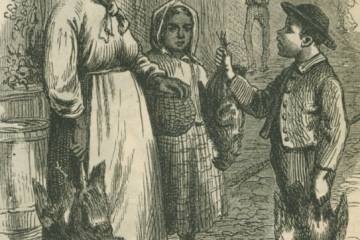A $2 million grant from The Andrew W. Mellon Foundation will help create the Diaspora Solidarities Lab, a multi-institutional Black feminist digital humanities partnership that supports solidarity work in Black and ethnic studies by undergraduates, graduate students, faculty members, and community partners committed to transformative justice and accountable to communities beyond the Western academy.
The DSL is a partnership between Johns Hopkins and Michigan State University. Its founders and directors are principal investigator Yomaira Figueroa-Vásquez, associate professor of global Afro-diaspora studies in the Department of English at Michigan State University and co-principal investigator Jessica Marie Johnson, assistant professor in Hopkins' Department of History; with Tao Leigh Goffe, assistant professor of literary theory and cultural history in the Department of Africana Studies and the Feminist, Gender, and Sexuality Studies Program at Cornell University.
The DSL uses a laboratory format and virtual meeting spaces to chart new methods in archival research, theory, and community practice, and to explore how the humanities can deepen its commitment to community. By bringing together scholars and community members focused on diaspora studies and Black feminist thought, the lab will serve as a hub connecting theory and creative technological practice, and engaging with artists, grassroots organizers, farmers, community historians, and local activists as knowledge producers.
Expected outcomes will include the formation of knowledge communities and curricular material that span institutions to reach beyond the academy in meaningful and mutually beneficial ways. These will include community partnerships; graduate student scholarly and professional development informed by Black and ethnic studies theories and methodologies; and research in the form of open access digital modules and analog and digital publications.
At Johns Hopkins, the grant will support the creation of the Community Knowledge Lab, directed by Johnson. The lab will train DSL members in digital skills, support research initiatives, and run incubators where members learn methods and theories for centering community and Indigenous knowledge practices. The lab joins Black Beyond Data and Inheritance Baltimore (both Mellon-supported projects) as well as Keywords for Black Louisiana and the Hard Histories Lab, that have begun to make Hopkins a hub for the study of Black scholarship, life, and culture.
"By creating a space for intentional engagement between communities of scholars within the academy and those beyond the academy; by providing training in digital humanities theories, skills, and tools; and by doing work rooted in historical and research practices honed by BIPOC communities, the Community Knowledge Lab offers a different model for learning, teaching, and research on Black and Indigenous life," Johnson says. "Our audience isn't the academy and our rubrics aren't academic rubrics. Kinship with our communities, and world-building and dismantling empire are the goals. We know that we've always had all the tools we need to do more than survive. The CKL operates from the premise that community knowledge and imagination can remake the known world."
At the heart of CKL's work will be teaching about forms of community knowledge creation and how those intersect with histories of slavery, technology, data, and the digital, Johnson says. The lab will offer digital humanities and computation humanities skills workshops for faculty, graduate students, undergraduates, and the community through virtual events, workshops, and incubators.
The CKL will model community knowledge creation through five microlabs, which will produce curriculum/methodology documentation for public use that offers best practices for doing decolonial and diasporic Black and ethnic studies digital humanities work. It will start with four microlabs, open to graduate and undergraduate student participation and led by DSL faculty partners and/or Solidarity Fellows, including several Johns Hopkins students. The microlabs include:
- Taller Entre Aguas (TEA), where members will explore best practices for doing Black Puerto Rican digital history. Led by Afro-Puerto Rican scholar Sarah Bruno, currently an ACLS postdoctoral fellow at Duke University, TEA will work closely with Afro-Puerto Rican cultural and historical organizations in Puerto Rico and its diaspora to build out a set of methods for researching Black Puerto Rican "data" and decolonial and diasporic digital publishing.
- Archipelagos of Marronage (AOM), will explore geographies of Black persecution using sources like runaway ads and tools like ArcGIS/StoryMaps and Twine to experiment with models of turning surveillance practices inside out. The Solidarity Fellows involved include Hopkins history doctoral candidates Halle-Mackenzie Ashby and Greg Smaldone, and Nicole Viglini, a doctoral candidate at the University of California-Berkeley.
- Southern Digital Culture Lab (SDCL) will explore digital patrimony for Black southern culture bearers and centers Black communal archival practices and the use of social media, blogging, and digital archives to share and excavate histories. SDCL will be led by Solidarity Fellow and Hopkins history doctoral candidate Kelsey Moore.
- Kitchen Marronage: Taste Archives, directed by Tao Leigh Goffe, is a virtual test kitchen that will focus on the politics of plantation, Indigenous, Maroon, and Asian foodways and integrate with the Sites of ReMemory DSL summer microlabs in Puerto Rico (2022), Dominica (2023), and New Orleans (2024). In partnership with the Smithsonian affiliate the Museum of African Diaspora in San Francisco, the Asian Art Museum, and the Museum of Contemporary African Diasporan Arts in New York, co-creators will explore the kitchen as a radical site of rebellion, collusion, and cross-racial co-production.
The CKL will also support a series of Black Louisiana History Incubators. These intensive, virtual, one-time events with experts will occur in collaboration with partners in New Orleans, including DSL community partner the Black Schoolhouse, the site of the DSL's 2024 summer ReMemory Lab. Over the course of the grant, the incubators will bring genealogists, historical interpreters, tour guides, organizers, and artists, all compensated for their time, into the CKL (virtually) to explore how Black history has been maintained at the grassroots level in the face of slavery, segregation, divestment from historical institutions, and resource extraction by academics. Incubators range from workshops to lectures to tutorials with invited practitioners and DSL members.
The Mellon grant will fund the DSL for three years. Community partners include grassroots organizations, international archives, and museums, among other organizations.
The Andrew W. Mellon Foundation is the nation's largest supporter of the arts and humanities. Since 1969, the foundation has been guided by its core belief that the humanities and arts are essential to human understanding.
Posted in Arts+Culture
Tagged american history, black history, jessica marie johnson









